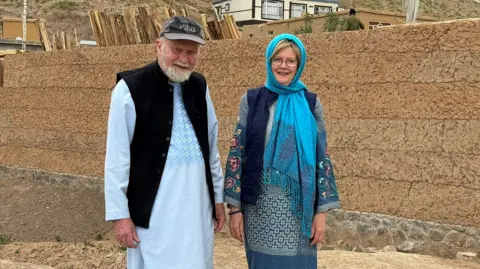Stanikzai’s departure was a further mark of protest against the regime’s “illogical and irresponsible policies,” one of them said.
With a new school year starting last week, almost 2.2 million girls have been deprived of their education in the country, according to UNICEF.
But there are few signs the Taliban will reverse their policy, leading some families to risk their lives to flee Afghanistan so women and girls can pursue their schooling elsewhere, said Sahar Fetrat, an Afghan researcher with Human Rights Watch.
Many “didn’t face persecution, per se; they left because they wanted to educate their girls,” she said, adding that their journeys are often “very risky and done in a very illegal way.”Gulalai, 15, said in an interview last month that her family decided to leave Kabul for Peshawar because her father, a grocery store owner, “wanted us to continue our education.”
“We were living a happy life. Then, suddenly, the Taliban suspended our education, and our dreams were shattered,” Gulalai said, speaking on the grounds of her new school.
NBC News has agreed not to use her last name because of fears for her safety.
After travel agents demanded $2,500 for each visa — far more than her family of seven’s entire savings — their only option was to bribe officials and cross the border illegally, Gulalai said.
A relative eventually helped them settle in a two-room house on the outskirts of this city in northeastern Pakistan, she said, adding that her father had gotten a job at a store and that her mother was cleaning families’ homes to help make ends meet.
Gulalai, who said she dreams one day of being a nurse, said she was struggling to settle in her new school because she does not speak or write Urdu, Pakistan’s national language.
She added that she had lost a happy life of close friends, relatives and classmates in Kabul. “There was no more life in Afghanistan; otherwise, who can leave their birthplace?” she said.
Even those who manage to escape safely eventually find that going to school remains out of reach in countries like Turkey or Iran, where there are strict restrictions on granting asylum, according to Fetrat, of Human Rights Watch.
In Pakistan, the government announced in January that it would oust all Afghan refugees living in the country by March 31. From September 2023 to February, at least 844,499 Afghan nationals were deported, according to Amnesty International.
“My father took a risk by migrating us to Pakistan,” Gulalai said, adding that she did not know whether her family would be allowed to stay or be forced to leave.
In Afghanistan, the Taliban, which appeared to take a more moderate stance after they took power, has cracked down further on women’s rights.
“Vice and virtue” laws passed in August now prohibit women from speaking in public, showing their faces outside their homes and moving in public spaces without male chaperones. “Whenever an adult woman leaves her home out of necessity, she is obliged to conceal her voice, face, and body,” the laws state.Despite internal pressure from some of their own members, it’s unlikely that the Taliban would shift their stance on girls’ education, said Gaisu Yari, an Afghan research fellow at the Wilson Center, a Washington-based think tank.
Since he came to power, Akhundzada has moved to consolidate his ranks by appointing several hard-line loyalists who have supported the ban to key Cabinet positions.
And while Stanikzai has supported girls’ education, “he now feels increasingly isolated due to his position,” Yari said, adding that his more moderate allies in Kabul could not go against their supreme leader’s directives.“The Taliban’s principles are difficult to change, particularly when it comes to women,” she said.
The decrees, she added, “have not only been established as policies but have been solidified into law, making them hard to reverse.”
Astha Rajvanshi is a reporter for NBC News Digital, based in London. Previously, she worked as a staff writer covering international news for TIME.
 Afghanistan Peace Campaign
Afghanistan Peace Campaign

